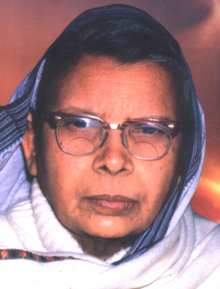Mahadevi Varma | |
|---|---|
 | |
| Born | 26 March 1907 Farrukhabad, United Provinces of Agra and Oudh, British India |
| Died | 11 September 1987 (aged 80) Allahabad, Uttar Pradesh, India |
| Occupation | Poet, essayist and sketch story writer |
| Alma mater | Allahabad University |
| Literary movement | Chhayavaad |
| Notable works |
|
| Notable awards | 1956 Padma Bhushan 1982 Jnanpith Award 1988 Padma Vibhushan |
| Spouse | Vikas Narayan Singh |
| Signature | |
 | |
Mahadevi Verma (26 March 1906 – 11 September 1987) was an Indian Hindi-language poet, essayist, sketch story writer and eminent personality of Hindi literature. She is considered one of the four major pillars[a] of the Chhayawadi era in Hindi literature.[1] She has also been addressed as the Modern Meera.[2] Poet Nirala had once called her "Saraswati in the vast temple of Hindi Literature".[b] Verma witnessed India before and after its independence. She was one of those poets who worked for the wider society of India.[3] er poetry, along with her work toward social upliftment and women's welfare, was depicted in her writings. These works, especially her novel Deepshikha, greatly influenced both readers and critics.[4]
She developed a soft vocabulary in the Hindi poetry of Khadi Boli, which before her was considered possible only in Braj bhasha. She was well-versed in music. The beauty of her songs lies in the tone that captures the euphemistic style of sharp expressions.[5] She started her career with teaching. She was the Principal of Prayag Mahila Vidyapeeth. Verma chose to live an ascetic life,[6][7] despite being married. She was also a skilled painter and creative translator. She had the distinction of receiving all the important awards in Hindi literature. As the most popular female litterateur of the last century, she remained revered throughout her life.[8] Her birth centenary was celebrated in 2007. Later, Google also celebrated the day through its Google Doodle.[9]
Cite error: There are <ref group=lower-alpha> tags or {{efn}} templates on this page, but the references will not show without a {{reflist|group=lower-alpha}} template or {{notelist}} template (see the help page).
- ^ Varma 1985, p. 38-40.
- ^ Ranu, Anjali. "Mahadevi Verma: Modern Meera". Literary India. Archived from the original on 21 March 2007. Retrieved 5 December 2020. Archived from the original Archived 21 March 2007 at the Wayback Machine on 21 September 2007
- ^ Mishra, Satya Prakash. "महादेवी का सर्जन: प्रतिरोध और करुणा" (in Hindi). Tadbhav.com. Archived from the original on 22 September 2007. Retrieved 7 December 2020. Archived from the original Archived 22 September 2007 at the Wayback Machine on 22 September 2007
- ^ Varma, Mahadevi. Deepshikha (in Hindi). Varanasi: Lokbharti Prakashan. ISBN 978-81-8031-119-2.
- ^ Varmā, Mahādevī; Pāṇḍeya, Gaṅgāprasāda (2012). महादेवी के स्रेष्ठ गीत (in Hindi) (2nd ed.). Kitābaghara. ISBN 9788170161868.
- ^ Jha, Fiza (11 September 2019). "Poet Mahadevi Verma and her undiscovered feminist legacy". ThePrint.
- ^ Teotia, Bimlesh. "साहित्य विचार - गद्यकार महादेवी वर्मा". Taptilok Publication. Archived from the original on 17 May 2006. Retrieved 7 December 2020. Archived from the original Archived 17 May 2006 at the Wayback Machine on 17 May 2006
- ^ Vasistha, R.K. (2002). Uttar Pradesh (Monthly Magazine) Issue 7. Lucknow, India: Information and Public Relations Department, U.P. Page 24.
- ^ Taneja, Richa (27 April 2018). "Mahadevi Varma Is Today's Google Doodle: Know All About The Celebrated Hindi Poet". NDTV.com.